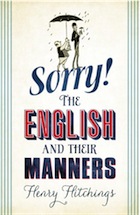 I loved the dry wit in the final sentence of this paragraph of a book I have for bed-side reading, Sorry! The English and Their Manners by Henry Hitchings:
I loved the dry wit in the final sentence of this paragraph of a book I have for bed-side reading, Sorry! The English and Their Manners by Henry Hitchings:
Beside the encounters I’ve so far dealt with, there is another kind of meeting: a formal assembly. In the Middle Ages meetings were armed encounters: local disputes were settled by means of a ‘moot’ at which proposals were approved with a banging together of weapons — or dismissed with groans. These attempts to negotiate arguments gradually became less military in temper. During the Renaissance, urbanization and political centralization gave rise to a more parliamentary style of meeting, over which courtiers presided. Urbane discussion became the mechanism for resolving or curtailing differences and achieving solidarity. Yet even in the nineteenth century the word meeting was a euphemism for a duel — a hangover from a less bureaucratic age. And today meeting is associated with other ways of taking lives or at least sapping vitality. (pp. 50-51)
How can any discussion of the pain of meetings avoid the old John Cleese classic . . .
